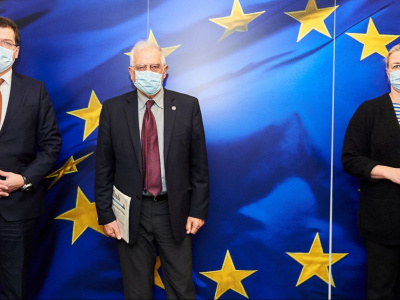
Emerging economies as global development partners
Taking the long-term view and investing in development For any observer of the headlines of reports and newspapers on the increasing role and power of emerging economies, the past few years must have resembled a rollercoaster ride. From the “Rise of the South”[1] and “Shifting wealth”[2] the headlines changed to doubts and social unrest, “hard awakenings”, the “demystification” of models, “emerging economies in a trap” and “the end of the dream”. The overall mood seemed to swing as fast from one extreme to the other as the structural outlook of companies, currencies and countries at the stock markets. However, development experts need to take the long-term view. We know through sometimes hard learning and experiences in the course of more than 50 years of development cooperation, that sustainable progress and structural change can only be achieved in the medium to long term, that there is always the risk of fallback and that good plans do not necessarily or automatically lead to good results. Need for development cooperation to adapt and take a differentiated view The long-term view tells us that relevant and enormous changes have been taking place in parts of the developing world over the course of the past 10 to 20 years, economically, socially and politically. We know that this has even helped those developing countries where structural change has not yet taken place. We also know that there are great opportunities in the changes that have taken and are taking place. And that there are risks too that need to be addressed. But what is also important, is that we see and analyse the differences between individual emerging economies and do not throw all middle income countries into the same pot based on one criteria: “The simple crossing an artificial per capita income threshold is not an indicator of structural change”.[3] Emerging economies and middle income countries have many faces to them and – depending on the side of the face you look at – it can mirror their modern, industrialised country image or the side depicting their status as a developing country.[4] Differentiation within the group of middle income countries still makes sense. BMZ’s approach Development cooperation also has to adapt to these changes and needs to anticipate future trends that follow. Already in 2004, the German Federal Ministry for Economic Cooperation and Development (BMZ) presented the results of intensive research work on development cooperation with emerging economies in its position paper “Anchor Countries – Partners for Global Development”. It set out a path on development cooperation with a selective number of mostly larger emerging economies. Programmes such as the Managing Global Governance Programme were set up to build a network of emerging partners with Germany to jointly work on global governance issues. In 2010/11, BMZ wrote and published its “Strategy for Development Cooperation with Global Development Partners (2011 – 2015)”, even before the German government agreed on its overall framework for working with emerging economies called “Shaping Globalization – Expanding Partnerships – Sharing Responsibility” in 2012. The BMZ strategy from 2011 outlined its development cooperation with five major emerging economies: India, Indonesia, South Africa, Brazil and Mexico. It set out two dimensions of cooperation: a) cooperation in the countries themselves through bilateral projects and programmes (this was reserved for the mentioned five countries); b) international cooperation with global development partners to shape regional and global development agendas (this extended both to the core group of five and to other emerging countries such as China). The term “global development partner” nicely captures this new direction. Development cooperation with these countries was to focus on three main areas of activity:
- mitigating climate change, preserving the environment and thus making development ecologically sustainable;
- promoting sustainable economic development, for example through the creation of appropriate economic and trade policy, education policy or legal and institutional frameworks;
- shaping global development agendas.


